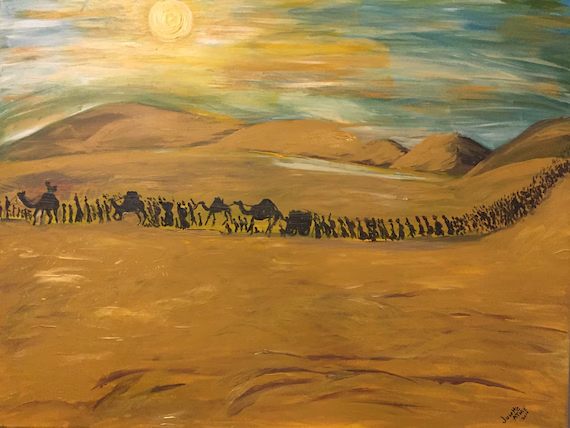The Birth of Jesus
Mary returned to Nazareth and to Joseph, to whom she was engaged. Joseph had heard she was going to have a baby.
He was very worried. He was a kind man, but he felt it wasn't right that he should marry her.
One night, he had a dream, and the angel told him that Mary had done nothing wrong, and that he should marry her.
Her son was the Son of God. He was to be called Jesus, and he would save the people from God's punishment for the wrong things they had done.
The next morning, Joseph remembered what the angel had said to him in his dream. He made arrangements for the wedding, and soon he and Mary were married.
Joseph vowed that he would always take care of Mary and her son.
Mary and Joseph lived happily together in Nazareth, looking forward to the birth of Mary's baby. A few months later, the Roman Emperor Augustus, who ruled Israel, made a new law.
Everyone must go to the town their family came from, to register so they could be taxed. Joseph's family was descended from King David, and so he had to travel to Bethlehem, where David was born.
Joseph packed up food, water and warm clothes, and clothes for the baby, and loaded them onto his donkey.
Then he and Mary began the long journey, which took many days, across the hills of Galilee to Bethlehem.
It was late evening when they arrived, and Mary was very tired. She knew her baby would be born soon.
The streets were noisy and crowded with people who had come to register. Joseph tried to find a room for them to stay in for the night, but every inn they stopped at was already full.
He trudged through the cold, dark streets, leading the donkey which carried Mary.
When they came to the last inn, the inn-keeper told them that all his rooms were already taken. But there was a stable nearby they could shelter in for the night.
Joseph led the donkey to the stable. He gently helped Mary down and unloaded their things. Then he spread out clean straw on the floor to make a soft bed for her, and covered it with his cloak.
Mary ate a little food and lay down, thankful that she could rest at last.
That night, Mary's baby was born. She washed him and wrapped him in the clothes she had brought with her. Joseph filled a manger with soft, clean hay to make a bed for the baby, and Mary laid him in it.
She called her new son Jesus, as the angel had told her, and she knew he was the Son of God.
On the hills outside Bethlehem, a group of shepherds lay around their camp fire, guarding their sheep from wild animals during the night.
Suddenly, they saw a dazzling glow lighting up the dark sky. As they watched, it grew brighter and brighter, and an angel appeared in front of them: they felt very scared.
'Don't be frightened, said the angel. 'I have wonderful news for you, and for all people. Tonight, the Son of God was born. You will find him lying in a manger in Bethlehem.
As the shepherds stared in amazement, a great crowd of angels appeared, singing praises to God. 'Glory to God in the highest and peace on earth to all people who love Him, they sang.
Then the light faded, the angels were gone, and the night was dark again.
When they had recovered from their astonishment, the shepherds wondered what they should do. 'We must go to Bethlehem and look for this child we've been told about, said one. The others agreed.
Very excited, they quickly packed up their things and. leaving their sheep, they hurried down the dark hills to the little town.
They soon found the stable and, knocking on the door, crept quietly in. They looked at the baby, and knelt down in front of the manger. Then they told Mary and Joseph what the angel had said to them.
After a while, they got to their feet and left the stable. Once outside, they strode through the streets of Bethlehem, telling everyone they met the good news that the Son of God had been born that night.
By the morning, the whole town knew about the birth of Jesus.
Singing praises to God and full of wonder, the shepherds walked back to their sheep.
In the dimly-lit stable. Mary gazed at her baby. She thought about what the shepherds had told her the angel had said and wondered what it all meant.













Comments
Post a Comment